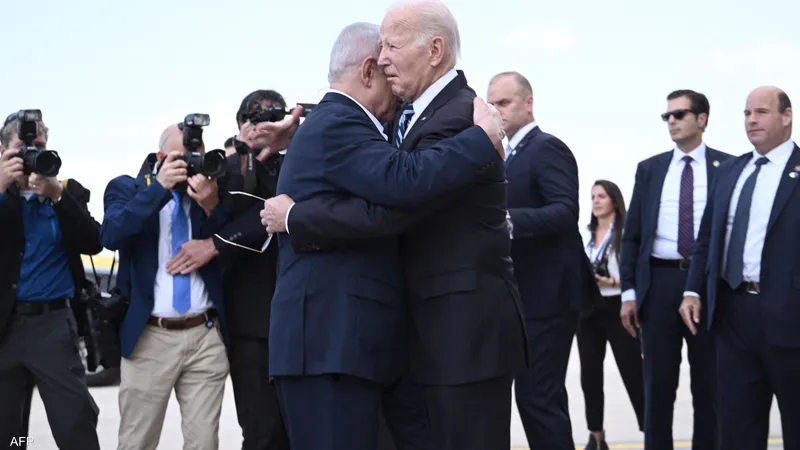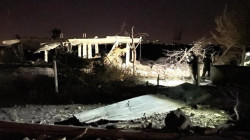FP: Israel Is Facing an Iraq-like Quagmire

Almost from the moment of “Israel’s 9/11”—even as U.S. President Joe Biden flew to Israel after the Oct. 7 catastrophe to show his complete support—the Biden administration began warning Israeli Prime Minister Benjamin Netanyahu’s government not to make the same mistakes the United States did after its own 9/11.
In other words, don’t get bogged down in an endless quagmire with no way out. Don’t create more terrorists by using brutal tactics. Don’t do what we did by invading and occupying Iraq. “Justice must be done. But I caution this—while you feel that rage, don’t be consumed by it,” Biden said during that visit last October. “After 9/11, we were enraged in the United States. While we sought justice and got justice, we also made mistakes.”
Six months in, it’s safe to say that advice didn’t take. Israel—still very much consumed by rage—is clearly getting pulled into an Iraq-like quagmire in Gaza. Like the Baath Party in Saddam Hussein’s Iraq, much of Hamas’ leadership is gradually being destroyed. In fact, U.S. officials say Israeli tactics have been more effective than they thought, especially in penetrating the tunnel network with a minimum of Israeli casualties. But Israel has not even begun to contemplate a viable way out. And as in Iraq, there are already signs of a rising insurgency, and a new generation of militants, that could bedevil Israel for years.
Indeed, despite the very public criticism of Israel’s scorched-earth military campaign in recent weeks, U.S. officials say that what irks them even more than the ongoing humanitarian disaster is Israel’s complete failure to consider what it’s going to do in Gaza even one day after.
“If there’s one extreme frustration with the Israeli side, it is the lack of any credible phase four plan,” a senior Biden administration official said in an interview, referring to the post-conflict phase when some form of governance is restored to the Gaza Strip. (Phase one was the air bombardment after Oct. 7; phase two, the ground invasion; and phase three will be mop-up.)
The Israeli government hasn’t moved beyond the idea of organizing local clans to run things and is completely rejecting the idea of a “reconstituted” Palestinian Authority (PA) to take over Gaza. Even the more moderate opposition leader, Benny Gantz—Netanyahu’s most likely successor as prime minister—doesn’t want to bring in the PA, the official added, and plans have remained stuck at vague concepts of a transitional council composed of unknown potential members.
“The Arabs are ready to help, but they’re not just going to glom onto some new [Palestinian] creation if it’s not defined,” the official said.
For months, U.S. Secretary of State Antony Blinken has flown back and forth around the region to orchestrate what could be a promising future regional peace structure for Israel. This includes the once-unimaginable possibility of recognition by Saudi Arabia and virtually every other Arab state. All the Israelis would likely have to do in return, after disposing of Hamas’s leadership and military structure (which the other Arab regimes have little use for), would be to show a willingness to discuss some possibility of Palestinian statehood or autonomy. And even in the event of Palestinian statehood, all parties know that statehood would never mean total sovereignty in terms of military capability. Any new “Palestine” would be a rump state.
Yet the Israelis, still traumatized by Oct. 7, aren’t discussing any of this—not even conceptually, according to Biden administration officials and other observers. One problem, as officials in the Biden administration acknowledge, is that after the horrors of the Hamas attack, even moderate Israelis can’t yet stomach the idea of handing the Palestinians a state or even an autonomous entity, and Netanyahu can’t keep his fragile right-wing coalition together unless he continues to robustly oppose the idea.
The Americans haven’t helped much with their own signaling. While Biden in recent weeks has hammered Netanyahu in public over the humanitarian disaster, the U.S. president hasn’t pushed a political solution in a very visible way. After Israeli accusations that some United Nations Relief and Works Agency (UNRWA) staff might be connected to the Oct. 7 attacks, Biden even agreed to defund the UNRWA through March 2025, although that group is the only organized non-Hamas bureaucracy operating in Gaza. With about 13,000 employees in Gaza, most of them Palestinian, UNRWA operates health clinics, infrastructure projects, schools, and aid programs, and more than 1 million Palestinian refugees are still sheltering in its facilities.
The partial crippling of UNRWA in turn has worsened the humanitarian crisis as the few truck convoys that do get through tend to get mobbed, with food and assistance distributed unevenly. U.N. Secretary-General Antonio Guterres said 2 million Palestinians in Gaza, or 87 percent of the population, depend on the UNRWA for sustenance.
“The failure to distribute aid is actually the biggest bottleneck at the moment,” said Michael Koplow of the Israel Policy Forum in Washington. Koplow points to the chaos and violence by armed gangs—and in some cases shootouts between returning Hamas militants and PA or Fatah gunmen—that have arisen in the north and in the area of Khan Younis as the Israelis withdraw, thus exacerbating a crisis begun by the Israeli blockade. “There are no more functioning institutions, and no plan has been set forth for replacing any of them,” he said in a phone interview.
Privately, most Israeli security officials recognize that their government is being unrealistic both about the humanitarian crisis and their ability to contain it, as well as postwar governance. “Israeli security officials are clear eyed on the fact that neither local clans, nor municipal officials can be expected to meet on their own the daunting tasks of governing and rehabilitating the Strip,” Nimrod Novik, a former senior advisor to the late Prime Minister Shimon Peres, said in an email. “These tasks require massive outside support. However, outsiders—first and foremost key regional players [such as Saudi Arabia and the Gulf states]—refuse to engage (beyond short-term humanitarian assistance) unless it is all done in coordination with the PA.”
Congressional supporters of Israel echo these concerns, saying that the Israeli failures carry too many memories of the way the U.S. invaded Iraq without any kind of credible plan for governance after “de-Baathification”—the term used for the U.S. process of removing key elements of Hussein’s regime from Iraqi governance. “I’m deeply worried about what happens in Gaza after the war ends,” U.S. Sen. Chris Murphy said in an interview. “My chief worry is that this campaign is going to end up with anti-Israel sentiment being stronger, not weaker. … We have to see a viable plan for who controls and runs Gaza.”
On Capitol Hill, congressional oversight of aid to Israel—once as routine as a traffic cop lazily waving through a never-ending motorcade—has suddenly become a serious business. But almost all efforts are now focused on making aid and support to Israel conditional on the opening up of humanitarian corridors rather than plans for after the war. A few key examples: An $18 billion sale of F-15s to Israel, along with other major military aid packages, will not just sashay through the congressional notification process as usually happens, said Sen. Chris Van Hollen, who has led a campaign in the Senate to apply new tough standards to military aid. “We will use all the tools in our toolbox to discourage the Biden administration from going down that path,” Van Hollen said in an interview.
Van Hollen also said the administration has promised the senators a full briefing before a May 8 deadline for accountability under the president’s national security memo from February. That memo, prompted by a threatened Van Hollen amendment to a spending bill, requires a pledge by Israel that any future U.S. aid will be used in accordance with international law and humanitarian standards, to be followed by a 45-day assessment period by the State Department. “The whole purpose is to keep the spotlight on this,” Van Hollen said, adding: “I would hope the Biden administration would want to avoid a big fight in the Senate about sending more offensive weapons to the Netanyahu government.”
But here, too, the issue of post-conflict Gaza remains an afterthought, and in any case, there is not nearly enough congressional support for a full-on stoppage of military aid. Nor is Biden likely to support such a move, despite political pressure from progressive elements in his party seven months before the U.S. presidential election. True, perhaps never before has the defense of Israel, a constant in U.S. politics, been so toxic. But neither has any U.S. president been as passionately committed to Israel as Biden.
Murphy warned that, as a result, U.S. leverage on Israel will remain limited. “I think we have to be sober-minded about the ability of U.S. policy to influence Netanyahu’s decision-making,” he said. “This campaign is not dependent on U.S. aid. Israel is not Ukraine. They have the resources to continue this campaign with or without the United States.”
In the past, Israel has rarely moved on a political solution to the Palestinian issue without intense pressure from Washington. Today’s U.S.-Israel tensions are probably the worst since the George H.W. Bush administration more than three decades ago. At that time, then-Secretary of State James Baker threatened to withhold loan guarantees from Israel unless it stopped building settlements on the West Bank as a prelude to entering into serious peace negotiations with the Palestinians.
That American pressure ultimately laid the groundwork for the Oslo peace process, which led to repeated failures by Israeli and Palestinian negotiators to come to terms for statehood. That in turn gave rise to another intifada and ultimately the takeover of Gaza by Hamas. All in all, the nearly two-decade-long Oslo ordeal left many Israelis dubious of U.S.-led peace efforts. And that was before Oct. 7. It is likely to be doubly true today.
All signs point to a long and bloody quagmire ahead. Israel is indeed confronting its own 9/11— in more ways than one.
(By Michael Hirsch for the Foreign Policy)
Disclaimer: The views expressed in this article do not necessarily represent the official standpoint of Shafaq News Agency.





